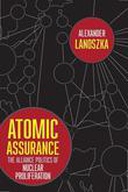Explore

Do alliances curb states from developing nuclear weapons? If so, what kind of alliances work best and how do they function? This book looks at what makes alliances credible enough to prevent nuclear proliferation, how alliances can breakdown and encourage nuclear proliferation, and whether security guarantors like the United States can use their alliance ties to end the nuclear efforts of their allies. The author finds that military alliances are, surprisingly, less useful for preventing allies from acquiring nuclear weapons; that it is easier to prevent an ally from initiating a nuclear program than to stop an ally that has already started one; and that economic or technological reliance works better to reverse or to halt an ally’s nuclear bid than other factors. This book uses intensive case studies on West Germany, Japan, and South Korea, as well as a series of smaller cases on Great Britain, France, Norway, Australia, and Taiwan, to examine this critical issue.
This book is made open access as part of the Knowledge Unlatched KU Select 2018: HSS Frontlist Books
This book is made open access as part of the Knowledge Unlatched KU Select 2018: HSS Frontlist Books
This book is included in DOAB.
Why read this book? Have your say.
You must be logged in to comment.
Rights Information
Are you the author or publisher of this work? If so, you can claim it as yours by registering as an Unglue.it rights holder.Downloads
This work has been downloaded 1445 times via unglue.it ebook links.
- 181 - pdf (CC BY-NC-ND) at OAPEN Library.
- 310 - mobi (CC BY-NC-ND) at Unglue.it.
- 350 - pdf (CC BY-NC-ND) at Unglue.it.
- 366 - epub (CC BY-NC-ND) at Unglue.it.
Keywords
- KUnlatched
- Political Science
- Political Science / Security (National & International)
Links
DOI: 10.7591/cornell/9781501729188.001.0001Editions

